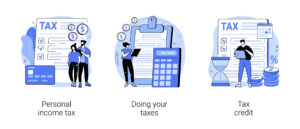When Should You Receive Your Tax Refund?
![shutterstock_352655828-[Converted] shutterstock_352655828-[Converted]](https://groco.com/wp-content/uploads/2021/02/shutterstock_352655828-Converted.jpg)
The top question on everyone’s mind at tax season is when will get my refund? After all, that’s the only incentive people really have to do their taxes. The problem is the answer is never set in stone. Despite claims from the IRS that just about everyone should receive their refund within 21 days of filing their return (if it’s filed electronically), that doesn’t always happen.
The nation’s top tax agency even offers a helpful “Where’s My Refund” page for taxpayers to track the progress, but when your refund is delayed there are times when this page doesn’t offer much help. The problem is there are several things that can delay your refund and sometimes you won’t know what’s going on until several weeks later when a letter from the IRS arrives in the mail explaining the situation.
So what can cause your refund to be delayed? This year, any one claiming the earned income credit and/or the Additional Child tax Credit will have to wait longer for their refunds, which won’t start being issued until Feb. 15, but likely won’t arrive till Feb. 27.
If your return has any errors, like math mistakes, or it is incomplete, like a missing signature or form, then your refund will likely be delayed until the IRS determines the issue and you get it resolved. In addition, if the IRS thinks you are trying to defraud the government your refund will certainly be delayed.
On the other hand, if you or your CPA has filed your return correctly, and electronically, then in almost all cases you won’t have to wait longer than the expected three weeks.
https://www.fool.com/retirement/2017/02/07/when-will-i-get-my-tax-refund.aspx
IRS Notice 2009-62 Issued 8/7/09
IRS Notice 2009-62 Issued 8/7/09 The due date for reporting the existence of Offshore Bank Accounts on Treasury Department Form TD F 90-22.1 has been an issue of great confusion in the last few months. Form TD F 90-22.1 is known as Foreign Bank Account Reporting (AKA “FBAR”) For a complete review of this soap…
Income the IRS Can’t Touch
Income the IRS Can’t Touch There’s one readily available and legal source of untaxed income that we know of: municipal bonds. These securities are issued by state and local governments, school districts, hospitals and other public agencies to support community projects and services. To permit these worthy endeavors to raise money economically, Uncle Sam exempts…
Avoiding Real Estate Tax Revaluations
Avoiding Real Estate Tax Revaluations by Steven Singer, CPA As a result of the passage of Proposition 13 almost thirty years ago, real estate owners currently enjoy paying property taxes based on the property’s purchase price, value of improvements and an annual increase of 2% over the previous years’ assessed value. As a result of…
Annuities in Qualified Retirement Plans
Annuities in Qualified Retirement Plans By Russell Hill Using annuities in qualified retirement plans. Qualified annuities reduce your current taxable salary in addition to accumulating tax deferred earnings, when you contribute money to an annuities program through an employer (as one of the investment options in a salary reduction retirement plan). Those who work for…


